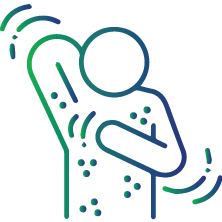
Allergy panel Test
About Allergy panel:
Allergy refers to a medical condition where your body’s immune system overreacts to foreign particles, which are otherwise harmless to other people. Substance that causes allergy are referred to as allergens.
Allergy panel involves identification of allergens such as mold, pet dander, bee stings, pollen, etc that can cause allergy. If you have an allergic reaction when you get in contact with any of these substances in your immediate environment then it indicates you are allergic to these substances. People also exhibit allergic reaction to food substances such as peanut, milk or soy etc.
Causes of allergy:
1. Genetic predisposition
2. Environmental factors – such as, dust mite droppings, animal dander, pollen grains, latex (natural rubber), diet, medications etc.
Symptoms of allergy

Headaches

Itchy, watery eyes

Sneezing

Difficulty in breathing

Swelling of body parts exposed to allergens

Stomach ache

Vomiting

Skin rash
Tests included in Allergy panel:
An allergy panel is a collection of tests that look for the most common allergens in the country. As a result, the most specific diagnosis is made, and results are provided. The tests included in the allergy panel tests are:
Allergy, non-veg Food panel:
-
This panel looks for allergies to beef, chicken, egg white, egg yolk, fish, pork, salmon, prawn, and tuna, among other things
Allergy, paediatric panel:
-
This panel screens children for allergies to almonds, aspergillus fumigatus, cat dander, cockroach-, dog dander, egg white, fish, house dust, peanut, milk, rice, and other foods
Allergy, Rhinitis/ Asthma/ Inhalant panel:
-
This panel looks for allergies to honey mesquite, acacia, aspergillus fumigatus, dog dander, elm, eucalyptus gum tree etc
Allergy, veg food panel:
-
This panel looks for allergies to egg plant, aubergine, banana, chickpea, gluten, lemon, lentil, rice, soyabean, tomato, pineapple, wheat and papaya, etc
1.
Types of allergy test:
There are various types of allergy test. Based on your symptoms you are advised one or more of the following tests:
1. Skin prick (scratch) test – A few droplets of potential allergens are dropped onto your skin and gently scratched, allowing these droplets to enter your skin. Within 10-15 minutes of exposure, reactions such as skin redness or rash may occur. This test looks for allergies to airborne particles, foods, and penicillin.
2. Intradermal skin test – This test is recommended if your skin prick test results were negative or inconclusive. Your epidermis is exposed to trace amounts of allergens (outer layer of the skin). This test looks for allergies to irritants in the air, medications, and insect stings.
3. Patch test – This test aids in the diagnosis of contact dermatitis. You may be given an allergen-containing patch (bandage). You leave the bandage on for 48-96 hours. If you notice any rash or reactions after removing the bandage, it is likely the reason to your contact dermatitis.
4. Blood test (IgE) – Your blood sample is taken, and allergens are added to it. The levels of IgE antibodies are measured after the allergens are added to the blood sample. These tests could produce false-positive results, at times.
5. Challenge test – This test is performed under the supervision of a medical professional. It entails administering a suspected allergen or drug that is suspected of causing allergy. If you have an abnormal reaction to this, an epinephrine injection is given right away to stop the reaction.
Who should get tested?

People who have Asthma

People who have had allergic reactions in the past and not got screened

People with certain skin conditions such as eczema or psoriasis

People who have pets in their house
Test preparation:
Your provider will ask you to stop taking any allergy medications 3 – 7 days before taking the test. Allergy medications stops immune responses to allergens and interferes with accurate test results. However, if you are an Asthma patient, you should continue taking asthma medication
Interpretation of the results:
Positive test result
If you have a positive test result to allergy panel, it means you are allergic to that particular allergen. Even if you are allergic to certain allergens it is not always necessary that you will have a reaction to those. Sometimes the results may also show false positive, especially from a blood test. A false-positive result indicates you have allergy to certain allergen though you don’t.
Negative test result
If you have a negative test result to allergy panel, it means you are not allergic to that particular allergen.
FAQs
Why do children require allergy panel testing?
Allergy panel testing in children can help you determine which substances are causing allergy symptoms in your child. Knowing the cause of allergy symptoms aids in proper diagnosis and lowering the likelihood of future exposures to the same substance that caused allergy symptoms in the past
Are children exposed to any risks as a result of the allergy panel test?
No, there are no absolute risks to children from allergy panel testing. However, a minor sting or bruise will be felt at the site of the needle puncture for sample collection
What are the different types of allergies one may experience?
Different types of allergies that one may experience include:
· Food allergy – due to certain food substances such as peanut, milk, and soy, etc
· Skin allergy – due to contact with certain allergens such as pollen.
· Dust allergy – Due to contact with dust mites etc
· Insect allergy – Due to insect stings such as bees, wasps etc
· Drug allergy – due to certain medication such as penicillin.
What is an anaphylaxis reaction?
Anaphylaxis reaction is a serious, life-threatening reaction of the body’s immune system that may occur with in few seconds of exposure to some allergens. A few symptoms to anaphylaxis reaction include sudden dropping of blood pressure, narrowing of airways, blocking breathing etc. These reactions need immediate treatment and does not resolve on its own.
How long does an allergy panel test results take?
Allergy panel is done at laboratory where in you are subjected to few allergens based on your symptoms and results are interpreted. It usually takes about 30 to 40 minutes. However, a few tests such as patch test will take few days to get the results
I have a known allergy to latex, and I was exposed to it during the test. Will it be dangerous for me?
Allergy panel is always recommended in the presence of professional healthcare provider. If any reactions are detected during testing, you will be given an antihistamine to help you overcome the effects of the allergens. In general, epinephrine is administered in severe allergic reactions
What are the benefits of allergy testing?
People all over the world suffer from allergies. These allergy tests may help reduce symptoms that range from minor discomfort to severe disability. The information from these allergy tests may help your healthcare provider to develop an efficient and accurate allergy treatment plan that help minimize the effects of allergy

